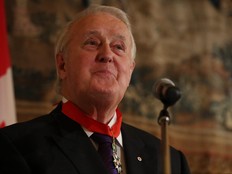TUESDAY RECAP: Trump announces widespread tariffs, calling it 'golden age of America'

Article content
Follow the Toronto Sun’s live coverage of Canada’s 45th general election and tariff-related news, with contributions from Brian Lilley, Bryan Passifiume, Lorrie Goldstein and columnists Joe Warmington and Warren Kinsella, as well as contributions from the Sun’s editors and reporters covering the election ahead of the April 28 vote. Plus, you can find all of our election coverage here.
TRUMP ANNOUNCES SWEEPING TARIFFS
WASHINGTON — President Donald Trump on Wednesday announced far-reaching new tariffs on nearly all U.S. trading partners — a 34% tax on imports from China and 20% on the European Union, among others — that threaten to dismantle much of the architecture of the global economy and trigger broader trade wars.
Trump, in a Rose Garden announcement, said he was placing elevated tariff rates on dozens of nations that run trade surpluses with the United States, while imposing a 10% baseline tax on imports from all countries in response to what he called an economic emergency.
The president, who said the tariffs were designed to boost domestic manufacturing, used aggressive rhetoric to describe a global trade system that the United States helped to build after the Second World War, saying “our country has been looted, pillaged, raped, plundered” by other nations.
The action amounts to a historic tax hike that could push the global order to a breaking point. It kickstarts what could be a painful transition for many Americans as middle-class essentials such as housing, autos and clothing are expected to become more costly, while disrupting the alliances built to ensure peace and economic stability.
Trump said he was acting to bring in hundreds of billions in new revenue to the U.S. government and restore fairness to global trade.
“Taxpayers have been ripped off for more than 50 years,” he said. “But it is not going to happen anymore.”
“This will be indeed the golden age of America. It’s coming back,” Trump added.
Trump declared a national economic emergency to levy the tariffs. He has promised that factory jobs will return to the United States as a result of the taxes, but his policies risk a sudden economic slowdown as consumers and businesses could face sharp price hikes.
Trump was fulfilling a key campaign promise as he imposed what he called “reciprocal” tariffs on trade partners, acting without Congress under the 1977 International Emergency Powers Act. But his action Wednesday could undermine the voter mandate last year to combat inflation that helped return him to the White House after a four-year hiatus, a choice that could carry tremendous economic risks for the public. Several Republican senators, particularly from farm states, have questioned the wisdom of the tariffs.
“With today’s announcement, U.S. tariffs will approach levels not seen since the Smoot-Hawley Tariff Act of 1930, which incited a global trade war and deepened the Great Depression,” said Scott Lincicome and Colin Grabow of the Cato Institute, a libertarian think tank.
Read the full story here.

NO NEW TARIFFS FROM TRUMP A HIT TO CARNEY’S CAMPAIGN
It’s not quite a presidential pardon, but we could call it a reprieve. Canada didn’t get any additional tariffs as U.S. President Donald Trump celebrated what he called “Liberation Day.”
Trump has been talking about new tariffs on Canada for months; he even went on a rant during his Rose Garden ceremony about how he sees Canada’s dairy industry as ripping off American farmers.
The bottom line is we didn’t get any additional tariffs added on Wednesday.
TARIFFS WILL FUNDAMENTALLY CHANGE GLOBAL TRADING SYSTEM: CARNEY
WASHINGTON — Prime Minister Mark Carney says U.S. President Donald Trump’s tariff regime will “fundamentally change the global trading system.”
Carney, who is meeting with his cabinet committee on Canada-U.S. relations in Ottawa, says Canada will fight tariffs with countermeasures after the country was excluded from new reciprocal tariffs announced by Trump today.
Canada is still affected by some tariffs, including on auto, steel and aluminum exports to the U.S.
WAIT IS ON FOR CANADIAN BIZ
U.S.-imposed tariffs — and Canada’s retaliatory levies — will wreak significant harm on Canadian businesses.
That’s what Canadian Federation of Independent Business (CFIB) president Dan Kelly said will come of Wednesday’s latest escalation in U.S. President Donald Trump’s trade war.
“If we go even with medium-sized tariffs, this is going to be a gigantic issue for small and medium-sized companies across the country,” Kelly said.
“The tariff threat, and in particular Canada’s retaliatory tariffs, it will deeply scar Canada’s business community.”
KEEP ON ROCKIN’ IN THE U.S.?
Neil Young is worried he won’t be allowed into the U.S. if he keeps publicly bashing President Donald Trump.
The 79-year-old Canadian-born rocker is about to embark on a European tour, and in a post on his website the two-time Grammy winner wondered if his frequent criticism of Trump might stop him from being allowed to re-enter America, where he lives.
TARIFFS TIMELINE
NEW YORK — Long-threatened tariffs from U.S. President Donald Trump have plunged the country into trade wars abroad — all while on-again, off-again new levies continue to escalate uncertainty.
Trump is no stranger to tariffs. He launched a trade war during his first term, taking particular aim at China by putting taxes on most of its goods. Beijing responded with its own retaliatory tariffs on U.S. products ranging from fruit to automotive imports. Meanwhile, Trump also used the threat of more tariffs to force Canada and Mexico to renegotiate a North American trade pact, called the U.S.-Mexico-Canada Agreement, in 2020.

DAMN THE TORPEDOES!
Perhaps, no one should tell President Donald Trump, but some of those torpedo bats making a splash in Major League Baseball might be considered cross-border imports.
The makers of these hot new torpedo bats are not only swinging for the fences but sending baseballs flying across the border from Quebec into the United States.

U.S. ATTACKING ITS ‘NUMBER ONE ALLY’ IN TRADE WAR, FORD SAYS
OTTAWA — U.S. President Donald Trump’s trade war was set to unleash a new salvo earlier Wednesday.
Describing Wednesday as “Liberation Day,” Trump’s single-handed war on U.S. imports has so far caused turmoil across financial markets, and increasing discussions of how Canada — and the world — can excise the United States from their individual economies.
Speaking with CNBC’s Andrew Ross Sorkin on Wednesday morning, Ontario Premier Doug Ford maintained the tariffs will hurt Americans as much as their trading partners.
“It’s going to hurt American jobs, it’s going to hurt investments, we’ve seen the markets tumble, I’m sure it’s going to start tumbling again today, because people don’t want uncertainty,” he said. “President Trump is attacking his number one ally, their number one customer.”
Describing Wednesday instead as “Termination Day,” Ford said numerous Americans will find themselves out of work thanks to Trump’s trade war.
CANADA COULD FLOURISH WITH ENERGY SECTOR UNLEASHED
Responding to U.S.-imposed tariffs and economic threats has to involve more than chanting, “Elbows up,” and yelling “Orange man’s bad” every time President Donald Trump’s name is mentioned, writes Brian Lilley.
What Trump’s threats of tariffs, of retaliation, and of deregulating the American economy have shown us is that we have truly become too reliant on selling our goods to the Americans.
Consider that in 2022, 76% of all Canadian exports went to the United States. In 1896, when Canada was part of the British Empire, we exported 60% of our goods to the empire. We are more reliant on the Americans than we were on the British at the height of Pax Britannia.
With or without Trump’s tariffs, this has to change. We need to expand our horizons, expand the markets we sell into, but also unleash the biggest advantage we have: Our natural resources.
TORIES LAGGING BEHIND LIBERALS, BUT VOTERS SAY THEIR MINDS COULD CHANGE
OTTAWA — As the federal election campaign enters its second week, the Conservatives still lag behind the Mark Carney Liberals — but roughly one-third of Liberal supporters say their minds aren’t quite made up.
New polling conducted this week for Postmedia by Leger have the Pierre Poilievre Conservatives sitting at 38% — six percentage points behind the Liberals, unchanged from last week.
EDITORIAL: CARNEY’S WRONG ON PIPELINE LAW
Liberal Leader Mark Carney confirmed this week that his party will not repeal Bill C-69 if his party forms the next government.
The legislation makes the regulatory burden greater and more complicated for new resource projects. It’s been dubbed the “no more pipelines” law and challenged in both the Alberta Court of Appeal and the Supreme Court of Canada, both of which ruled it unconstitutional. The Alberta court called it “a constitutional Trojan Horse” and said it “tears apart the constitutional division of power.” The Supreme Court of Canada agreed.
AVOIDING WHAT MATTERS
Liberal Leader and Prime Minister Mark Carney labelled Liberal candidate Paul Chiang’s call for other Chinese Canadians to turn in Joe Tay to Chinese authorities in Toronto a “teachable moment,” when announcing Monday he had no intension of firing Chiang as a candidate.
Chiang, of course, has since withdrawn on his own. Apparently even he was more disgusted by his own comments than Carney was.











Postmedia is committed to maintaining a lively but civil forum for discussion. Please keep comments relevant and respectful. Comments may take up to an hour to appear on the site. You will receive an email if there is a reply to your comment, an update to a thread you follow or if a user you follow comments. Visit our Community Guidelines for more information.